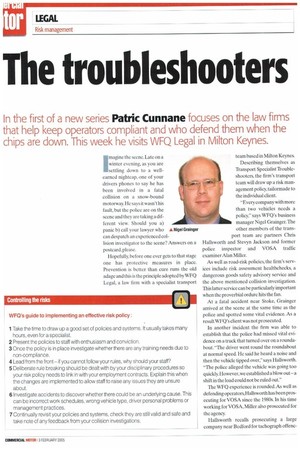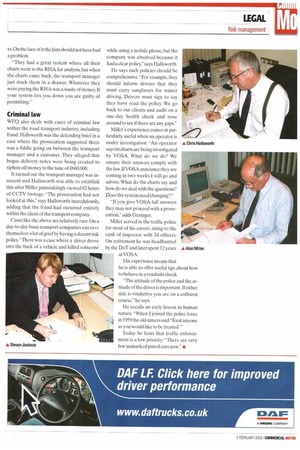The troubleshooters
Page 34

Page 35

If you've noticed an error in this article please click here to report it so we can fix it.
In the first of a new series Patric Cunnane focuses on the law firms that help keep operators compliant and who defend them when the chips are down. This week he visits WFQ Legal in Milton Keynes.
Imagine the scene. Late on a winter evening, as you are settling down to a wellearned nightcap, one of your drivers phones to say he has been involved in a fatal collision on a snow-bound motorway. He says it wasn't his fault, but the police are on the scene and they are taking a different view. Should you a) panic b) call your lawyer who A Nigel Grainger can despatch an experienced col lision investigator to the scene? Answers on a postcard, please.
Hopefully, before one ever gets to that stage one has protective measures in place.
Prevention is better than cure runs the old adage and this is the principle adopted by WFQ Legal, a law firm with a specialist transport team based in Milton Keynes.
Describing themselves as Transport Specialist Troubleshooters, the firm's transport team will draw up a risk management policy, tailormade to the individual client.
"Every company with more than two vehicles needs a policy." says WFQ's business manager Nigel Grainger. The other members of the transport team are partners Chris Hallsworth and Stevyn Jackson and former police inspector and VOSA traffic examiner Alan Miller.
As well as road-risk policies, the firm's services include risk assessment healthchecks, a dangerous goods safety advisory service and the above mentioned collision investigation. This latter service can be particularly important when the proverbial ordure hits the fan.
At a fatal accident near Stoke, Grainger arrived at the scene at the same time as the police and spotted some vital evidence. As a result WFQ's client was not prosecuted.
In another incident the firm was able to establish that the police had missed vital evidence on a truck that turned over on a roundabout. -The driver went round the roundabout at normal speed. He said he heard a noise and then the vehicle tipped over," says Hallsworth. "The police alleged the vehicle was going too quickly. However, we established a blow out a shift in the load could not be ruled out."
The WFQ experience is rounded. As well as defending operators,Hallsworth has been prosecuting for VOSA since the 1980s. In his time working for VOSA, Miller also prosecuted for the agency.
Hallsworth recalls prosecuting a large company near Bedford for tachograph offenc es. On the face of it the firm should not have had a problem.
-They had a great system where all their charts went to the RHA for analysis. but when the charts came back, the transport manager just stuck them in a drawer. Whatever they were paying the RHA was a waste of money. If your system lets you down you are guilty of permitting."
Criminal law
WFQ also deals with cases of criminal law within the road transport industry, including fraud. Hallsworth was the defending brief in a case where the prosecution suggested there was a fiddle going on between the transport manager and a customer. They alleged that bogus delivery notes were being created to siphon off money to the tune of £660,000.
It turned out the transport manager was innocent and Hallsworth was able to establish this after Miller painstakingly viewed 62 hours of CCTV footage. "The prosecution had not looked at this," says Hallsworth incredulously, adding that the fraud had occurred entirely within the client of the transport company.
Cases like the above are relatively rare. On a day-to-day basis transport companies can save themselves a lot of grief by having a decent risk policy. "There was a case where a driver drove into the back of a vehicle and killed someone while using a mobile phone, but the company was absolved because it had a clear policy," says Hallsworth.
He says such policies should be comprehensive. For example, they should inform drivers that they must carry sunglasses for winter driving. Drivers must sign to say they have read the policy. We go back to our clients and audit on a one-day health check and nose around to see if there are any gaps."
Miller's experience comes in particularly useful when an operator is under investigation. "An operator says its charts are being investigated by VOSA. What do we do? We ensure their answers comply with the law. If VOSA announce they are coming in two weeks I will go and advise. What do the charts say and how do we deal with the questions? Does the system need changing?"
"If you give VOSA full answers they may not proceed with a prosecution." adds Grainger.
Miller served in the traffic police for most of his career, rising to the rank of inspector with 34 officers. On retirement he was headhunted by the DoT and later spent 12 years A Alan Miller at VOSA.
His experience means that he is able to offer useful tips about how to behave in a roadside check.
'14 -The attitude of the police and the attitude of the driver is important. If either side is vindictive you are on a collision course," he says.
He recalls an early lesson in human nature. "When I joined the police force in 1959 the old-timers said:'Treat anyone as you would like to be treated:" Today he fears that traffic enforcement is a low priority: -There are very few unmarked patrol cars now." •


































































































































































































